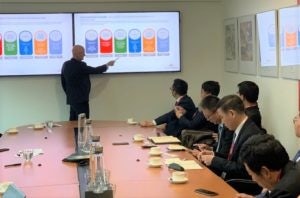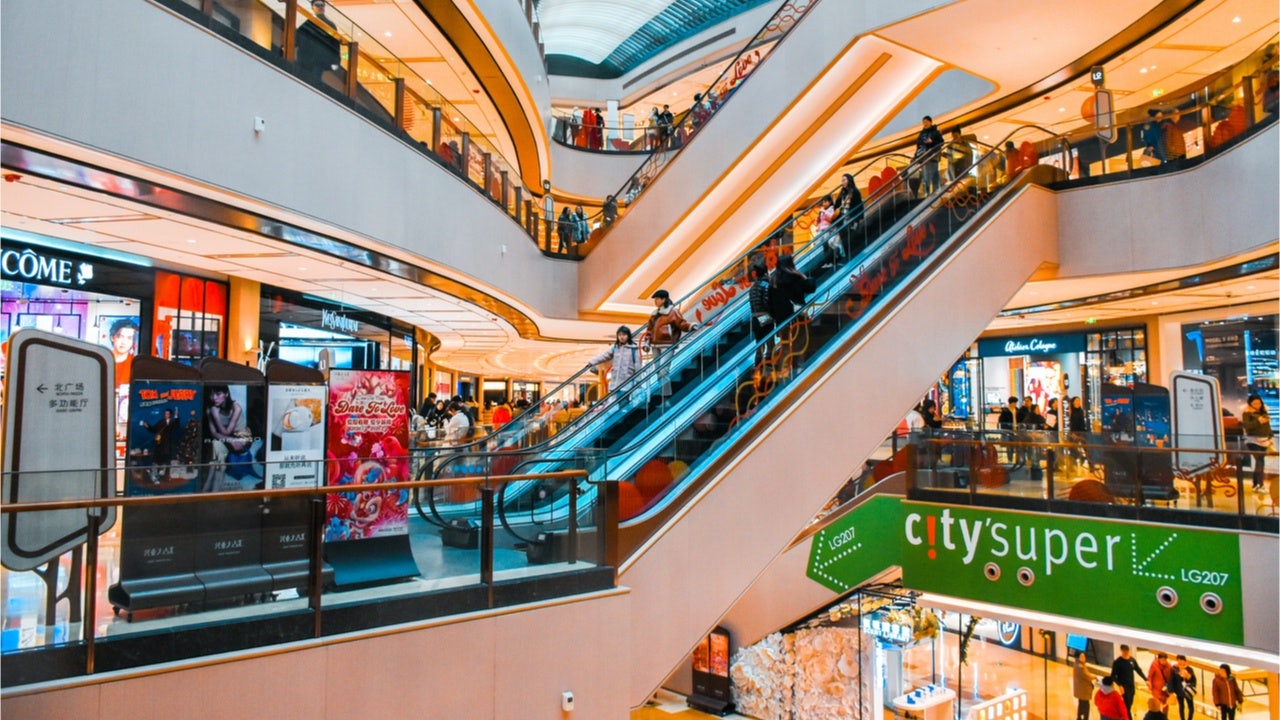This post originally appeared on The Moodie Davitt Report
CHINA#
. Interest in the burgeoning duty free sector continues to heat up in China with multiple domestic market players lining up license applications. But seeing those licenses granted will be a much greater challenge, market insiders warn.
As reported first by The Moodie Davitt Report’s Chinese information partner DutyFreeExpert, Beijing-based department store operator Wangfujing Group was granted a duty free license in June. This month, the retailer (which is attending the Moodie Davitt Virtual Travel Retail Expo in October) announced the creation of a wholly owned subsidiary duty free company

Early mover: Beijing-based department store operator Wangfujing Group, which was granted a duty free licence in June, has now created a dedicated company for the channel.
This week, publicly listed tourism services provider Lingnan Holdings of Guangzhou confirmed that its parent, Lingnan Group, has also applied for a duty free license. The disclosure (below) came in a stock exchange announcement after the company’s share price rose above +20% on both 14 and 15 July. The company cautioned, however, that the application was work in progress and its chances of success uncertain.
Lingnan Group is part of the Guangzhou State-owned Assets Supervision and Administration Commission.
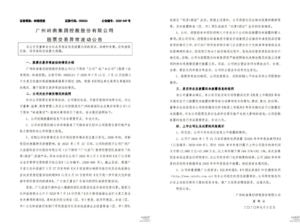
Lingnan Holdings responds to the sustained rise in its share price. Source: Sina.com
Meanwhile, Chinese media International Finance news and Sina.com also reported that Wuhan-based department store company Wuhan Wushang Group Co (listed as E Wushang A) had issued a similar disclosure on Wednesday (15 July) in response to abnormal fluctuations in stock trading between 13 and 15 July. “The company has submitted an application for the qualification of duty free goods management to the relevant government departments, but the work is still in progress,” Sina.com reported.
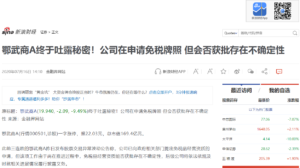
Sinanews.com headlines the news from E Wushang, noting, “There is uncertainty about whether the duty free license will be approved”.
“There is uncertainty in the approval,” the company noted, saying that it would provide further information in a correct and timely manner.
A senior representative of the company told International Finance News that it was too early to say whether a license would be granted. “Enterprises need to go through a certain process to obtain duty free business qualifications, which means that companies that have already declared [their application] are still some distance away from obtaining licenses. And even if they get licenses, the development of related businesses will not happen quickly.”
Wang Guoping, a member of the Senior Advisory group of Lian Shang.com told International Finance News that the odds of leading department store groups entering the duty free arena in first-tier cities such as Beijing and Shanghai are relatively high. However, he suggested that their focus might be on less-established brands than those found in existing duty free stores to avoid market turmoil.
The rush of interest in China’s domestic duty free industry is linked to the 13 March announcement issued by 23 departments including the National Development and Reform Commission and the Ministry of Commerce. This outlined a program to jointly develop China’s tax and duty free industry with the aim of building a well-rounded ecosystem “with Chinese characteristics”.
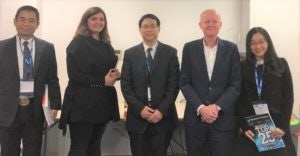
In late 2018, The Moodie Davitt Report was honored to meet senior representatives of the State-owned Assets Supervision and Administration Commission (SASAC) of the State Council, PRC at Moodie Davitt headquarters in London. Pictured left to right are SASAC Division Chief of Research Center (and Deputy Secretary General) Wang Jiang; The Moodie Davitt Report Publisher Irene Revilla; SASAC Deputy Director of Research Center Peng Jiangu; The Moodie Davitt Report Founder & Chairman Martin Moodie; and SASAC Section Chief of Research Center Zhang Jiahui.
Solve the ‘dual outflow’#
In an excellent leader article this week, Sina.com asked “What are ‘Chinese characteristics?’
“On the one hand, it means ‘serving both foreigners and outgoing residents equally’, on the other it sets up a domestic product sales area in duty free shops, supports domestic products, and builds its own brand identity,” the article stated.
“Generally, internationally, the purpose of opening duty free shops is to compete for the high-end consumption power of other countries, and to use tax free as a ‘bait’ to attract high-net worth people from other countries to come to consume. Although a part of the tax is lost, the increase in tourists drives sales of local food and accommodation. An industry chain for shopping and entertainment is also very cost-effective for tourists.”
To serve this population well, first- and second-tier cities need to build enough citywide duty-free shops so that high-net-worth people can easily buy big-name goods without going abroad for shopping
However, the article pointed out that such attractions have seen a disproportionate balance of Chinese spending made abroad. “The high growth rate of Chinese outbound travel in recent years is also closely related to the demand for duty free shopping overseas,” it said.
“At the same time, because duty free shops sell mostly foreign brand goods, this has led to a double outflow of China’s high-net-worth consumption power. On the one hand, tourism consumption flows to the destination country’s food, accommodation, travel, and tourism industry chain, and on the other, luxury consumption. These all flowed to Europe, Japan and South Korea, where big luxury brands and high-end cosmetics brands gather.”
The article notes that for a Chinese shopper traveling to South Korea, the duty free shopping saving will be enough to cover the entire travel expenses. “In this case, China’s major tourist cities cannot compete with South Korea and other countries,” it said.
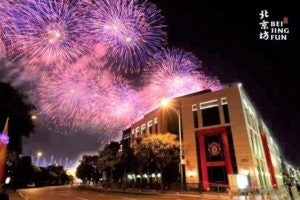
Established Chinese duty free players, too, are stepping up their expansion. (Above) CNSC plans to open a near 1,800 square meters, post-arrivals duty free store in Beijing FUN (北京坊) – an extraordinary two-phased commercial and cultural development just 100 meters away from Tiananmen Square and adjacent to the National Palace Museum, National Grand Theatre, National Museum and other renowned cultural institutions.

(Above and below) With Chinese domestic tourism set to soar in coming years, and the Hainan offshore duty free allowance being more than tripled on 1 July, China Duty Free Group is accelerating the completion of the magnificent Haikou International Duty Free Mall on Hainan island. The project, which began in 2019, will be completed within three years.

“The tax exemption system with Chinese characteristics is designed to solve this ‘dual outflow’. China’s high-net-worth people are located in major domestic first- and second-tier cities. To serve this population well, first- and second-tier cities need to build enough citywide duty-free shops so that high-net-worth people can easily buy big-name goods without going abroad for shopping.”
The article contends that a large number of first- and second-tier cities need to build duty free shops – and that a many domestic brands need to be deeply connected with those shops. It predicted that established domestic market players will fill those gaps, thanks for their well-established supply chains. The tax-exempt system will also boost the development of Chinese domestic brands, Sina.com stated.

The Chinese authorities are hugely supportive of the country’s duty free industry and are keen to maximize domestic consumption by developing internal capacity and capability. That interest was reflected in November last year when The Moodie Davitt Report Chairman Martin Moodie (above) was honored to host a high-level Chinese delegation, comprising senior representatives from China Duty Free Group, the Ministry of Finance and the Chinese Academy of Social Sciences. The delegation was on a key fact-finding mission about the global travel retail sector.
